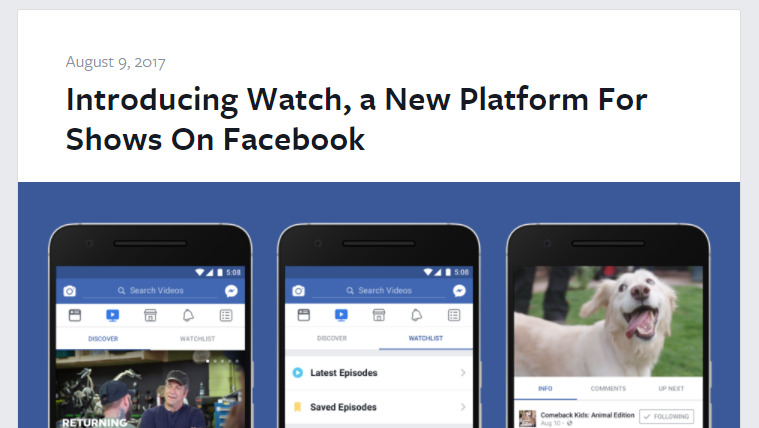
In the line of fire for Facebook: forget YouTube, it’s Amazon and Netflix (but there are problems...)

We’re introducing Watch, a new platform for shows on Facebook. Watch will be available on mobile, on desktop and laptop, and in our TV apps.
Shows are made up of episodes — live or recorded — and follow a theme or storyline. To help you keep up with the shows you follow, Watch has a Watchlist so you never miss out on the latest episodes.
That’s an excerpt from a Facebook Newsroom article posted last summer.
Prior to that news release, Mark Zuckerberg had said that he regarded video as ‘a megatrend’.
But Facebook has a problem or three.
Facebook Problem – & Solution – No.1
Firstly, Watch is not (yet) the success the social network’s CEO had hoped it would be, while Facebook Live has also failed to enthral the masses.
The early strategy of Watch – still only available in the US – of focusing on reality TV delivered limited success. Amazon Prime established itself by leading with ‘dramedies’ and taking on Netflix by placing a greater emphasis on the quality, rather than the quantity, of its original content.
Facebook, however, looked to build on the short-form content that many of its users were already widely sharing.
So what’s it doing to change this, given Watch’s stunted growth thus far?
Investing more in original programming.
Facebook’s targets are now more Amazon and Netflix than YouTube.
A billion-dollar plan
Facebook wants shows that make an impact, which is why it’s ordered its first drama series, ten half-hour episodes of the thriller Sacred Lies, and is reportedly ready to invest $1 billion on original content this year, with some series likely to be budgeted at a per-episode spend of between three and four million dollars.
Netflix, in contrast, is expected to spend $7 billion on original content this year (Amazon more than the $4.5 billion that went into premium video entertainment in 2017).
Facebook Problem & Solution No.2
But that’s where Facebook’s second problem comes in:
Facebook, to be successful in buying long-form content, must change habits – never easy to accomplish.
The Reuters report continues:
Facebook Problem & Solution No.3
As Facebook invests heavily in content, it’s having to combat a third problem: because fewer and fewer users’ posts show up in the news feeds of their friends and family, growing numbers of people who want to share content with their loved ones are doing so away from Facebook, often choosing WhatsApp groups or Messenger (both of which are owned by Facebook).
So Fb has very recently made an algorithm change to reduce the amount of content we see from commercial entities in order to increase the amount we see from friends and family:
This hasn’t impressed everyone: the move is described as “too little too late” by Techradar.
Facebook’s endgame
Facebook’s product management leader, Daniel Danker, said last summer:
Shows on Watch have comments enabled and some are incorporated into Facebook Groups.
The idea is that original content on Facebook will make TV, like everything else on the platform, a social experience.
We’ll watch and wait.

Netflix, Paramount and Warner Bros.: What the Deal Means for the Broadcast and Production Industry

How the Employment Rights Act 2025 Is Reshaping the Freelance Market
